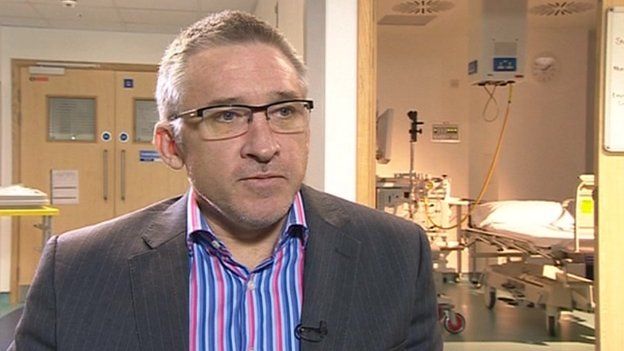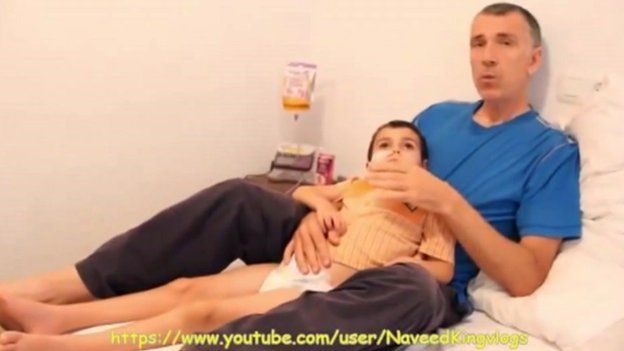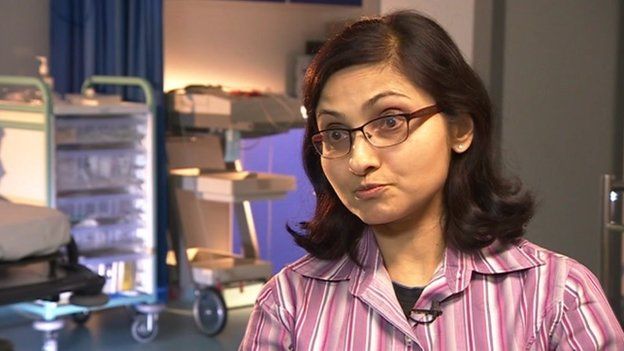Ashya King: Southampton hospital staff criticise parents
- t
Doctors and nurses who treated cancer patient Ashya King have criticised his parents while speaking out for the first time in a BBC documentary.
Ashya was being treated in hospital in Southampton when his parents took him abroad without telling staff last year.
They ignored medical advice and took him to Prague for proton beam therapy.
It was later revealed Ashya did not receive subsequent chemotherapy in Prague, a move the team in Southampton say could jeopardise his recovery.
Speaking exclusively to the BBC, Dr Peter Wilson, paediatric intensive care consultant at Southampton General Hospital, said: "We are unsure as to exactly what treatment he is receiving but what we do know is... every month that goes by that he's not getting chemotherapy, his outcome worsens.

"There are experts in the country that have already quoted figures of halving survival - so survival going from 80% to 40% or 50%, which is quite dramatic."
The Kings' version of events last year sparked a public outcry and staff members in Southampton said they received angry emails, letters and phone calls which, at one stage, forced the hospital to shut its switchboard.
The King family, who in March said five-year-old Ashya was now cancer free, declined to be interviewed as part of the BBC programme.

Has Ashya been cured?
In March, four months after the proton treatment ended, Brett King told a national newspaper a recent scan showed "no evidence" of the tumour.
But cancer experts have told the BBC although it appears Ashya is in remission it is far too early to say he has been completely cured.
Oncology specialist Professor Karol Sikora said: "Ashya is not completely out of the woods yet, but 78% of children with this type of rare cancer actually survive and are cured.
"The fact he is disease free at this point is great, but it doesn't mean he is cured yet."

The breakdown in the relationship between Brett King and the hospital stemmed from his belief that Ashya should not receive radiotherapy and chemotherapy following surgery to remove a brain tumour.
Mr King claimed in a YouTube video that staff threatened him with a court order if he refused Ashya's treatment, something the hospital has denied.
He told journalists in Spain after his arrest: "They were going to kill him in England or turn him into a vegetable."


Key events
- Ashya had surgery for a medulloblastoma brain tumour at Southampton General Hospital in July 2014
- His parents, Brett and Naghemeh, removed him from the hospital on 28 August and sparked a manhunt when they travelled to Spain
- They were arrested but later released and Ashya was flown to Prague, Czech Republic, for proton beam treatment
- He had six weeks of proton beam therapy, which cost between £60,000 and £65,000, according to the treatment centre, and was paid for by the NHS
- Ashya returned to hospital in Spain
- In March, Brett King announced his son was free of cancer

Through the media, the King family raised tens of thousands of pounds for Ashya's treatment before the NHS agreed to pay for proton therapy in Prague.
Dr Nicky Thorp, of the Children's Cancer and Leukaemia Group of paediatricians, said: "We were dismayed, but on reflection I can see why NHS England agreed to fund that child's case. The child was there, the child needed radiotherapy.
"The use of protons does not improve cure rates of tumours... and it saddens me to see the way the truth can be twisted and misunderstood."

In Prague, Ashya's parents refused the chemotherapy, which had been recommended by doctors and ordered by the High Court.
But in March, four months after the proton treatment ended, Mr King said his son was cancer free.
Paediatric oncology consultant Dr Ramya Ramanujachar, who was involved in Ashya's treatment, warned the case could set a worrying precedent.

She said: "I don't think the parents can look after their own child with a brain tumour and be not only the carers but also the professionals directing, managing and dictating their child's treatment."
Dr Wilson said the case had led to an "impossible situation" for clinicians faced with families in the same situation.
"That is deeply unfair when the NHS is always supposed to be about equal healthcare for all," he added.
Ashya: The Untold Story is to be broadcast on BBC1 in the South region on Friday at 19:30 BST.



